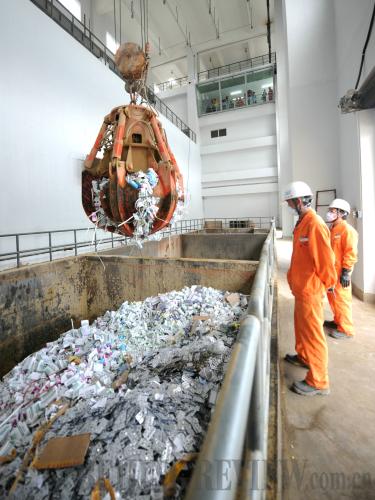|
 |
|
PROPER DISPOSAL: More than 50 tons of drug-prone chemical substances are destroyed in Yunnan Province on June 26 (QIN QING) |
"Chinese regions adjacent to the Golden Triangle and the Golden Crescent—Yunnan and Guangxi Zhuang Autonomous Region in the south, and Xinjiang Uygur Autonomous Region in the northwest—have been hit worst," said Li Wenjun, a professor specializing in drug control at the Chinese People's Public Security University in Beijing. "In addition, inflow of cocaine from South America is increasing and domestic drug production is also expanding."
Figures from China's Ministry of Public Security show the poppy growing area in north Myanmar has increased to 44,867 hectares this year, up 41 percent year on year.
Meanwhile, the cultivation of the poppy crop in Afghanistan reached 131,000 hectares in 2011, a year-on-year increase of 7 percent, according to an annual opium survey conducted by the UN Office on Drugs and Crime.
Drug control departments in Xinjiang last year cracked 10 major smuggling cases involving drugs from Afghanistan. The amount of seized heroin was about 20 times more than that of 2010, according to the police.
China had been basically free from drug perils for three decades since the founding of the People's Republic of China in 1949. In the late 1970s, Yunnan became the country's first area hit by the illicit use of drugs. The province has a 1,997-km-long land border with Myanmar and a 710-km border with Laos.
According to the China Drug Control Report of 2011, over half of China's narcotics imports were from the Golden Triangle area. In the early 1980s, drugs started to flow from Myanmar and Laos into Yunnan, which were then trafficked eastward to coastal Guangdong Province in the south and even further to Hong Kong and Macao.
"As Yunnan was on the drug trafficking route, some local people were enticed to use drugs and a local market gradually took shape," Chen Cunyi, Deputy Director of Narcotics Control Bureau of the Ministry of Public Security, told Southern Weekly, a newspaper published in Guangzhou, capital of Guangdong.
Responses
The Chinese Government responded to the growing illicit drug problem by intensifying punishments for drug-related crimes and setting up special anti-drug squads. In 1982 serious drug trafficking was made a capital offence. The same year, a 1,000-strong anti-narcotics force, the first of its kind in the country, was formed in Yunnan. This year marks the 30th anniversary of its founding.
Professor Liu at the Chinese People's Public Security University revealed that police authorities nationwide uncovered 529 cases involving drug manufacturing in China last year, an increase of 20 percent over 2010.
Some people also set up organizations on their own initiative to help drug addicts to kick the habit.
Meng Fanying, a 54-year-old anti-drug activist from Changsha, capital of central Hunan Province, set up the city's first non-governmental anti-drug education center for juveniles in 2008, which has offered help to more than 1,000 young people. As a veteran volunteer, she has also given nearly 100 lectures and presented books to many who are struggling to end their drug addictions, winning herself the nickname Anti-Drug Mom.
"The popularity of the Internet has made it easier for criminals to contact each other," said Liu. "Also, methods of producing drugs are evolving all the time, which makes crackdowns more difficult. Therefore more campaigns against drug production in China will be launched and closer international cooperation in drug control is necessary."
In November 2011, China, Laos, Myanmar and Thailand agreed to boost law enforcement and jointly conduct security operations along the Mekong River to combat drug and human trafficking.
Meanwhile, China has established a case-by-case cooperation mechanism with its three neighbors. Four police liaison offices have also been set up in border areas to facilitate investigations.
Under the agreement between China and Myanmar, police authorities in both countries have arrested and repatriated about 60 fugitives since 2009, including drug lords, according to figures from the Chinese police.
Email us at: lili@bjreview.com | 